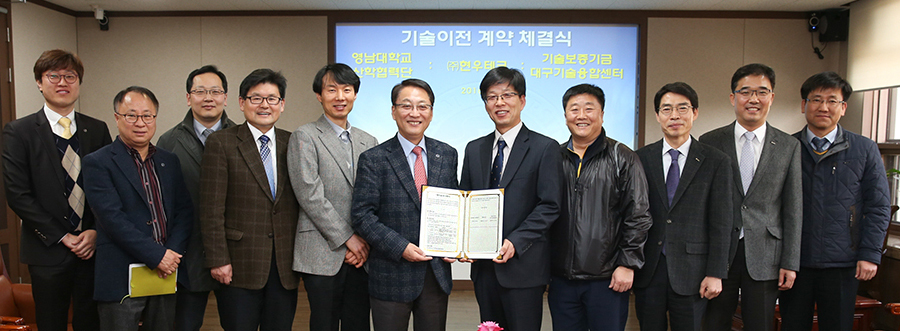Pursuing Corporate Future Businesses with 'YU Technology'! N
No.88848- Writer pr
- Date : 2016.03.02 09:44
- Views : 7649
'New material production technologies for medicine' developed by Professor of Chemical Engineering Kim Sung-cheol transferred to companies
Agreed to receive ‘400 million won in technology fees + 4% operational profits’
Fruit of research-oriented industry-academic cooperation, expected to be commercialized within 2 years
[February 18, 2016]

<Technology transfer contract signed between YU and Hyunwoo Tech on the 18th>
A local company will pursue future new businesses using the outstanding technologies possessed by YU (President Noh Seok-kyun).
The 'bio-compatibility polymer film for adhesion prevention film and bio-compatibility polymer film production method' developed by Professor of Chemical Engineering Kim Sung-cheol was transferred to a company and will be pursued for technological commercialization.
At 2 p.m. on the 18th at the reception room of the YU President, a signing ceremony for technology transfer with the participation of Hyunwoo Tech and the Korea Technology Finance Corporation Daegu Technology Convergence Center was held to begin full-fledged technology commercialization. At the signing ceremony were present YU President Noh Seok-kyun, Industry-academic Cooperation Team Director Park Jin-ho, Professor of Chemical Engineering Kim Sung-cheol, Hyunwoo Tech CEO Lee Nam-shik, Medical Instrument Business Department Director Kim Jin-woon, Korea Technology Finance Corporation Yeongnam Sales Division Director Kwak Young-cheol, etc. and they agreed to cooperate for the successful technology commercialization.
Hyunwoo Tech, which is located in Yangsan, Gyeongnam, is pursuing the medical instrument sector as its future new business. The company verified the excellence of the technology by participating in a technology transfer seminar held by the YU Technology Transfer Commercialization Center and has continuously discussed technological transfers and commercialization with YU since last year.
This patented technology possessed by YU is a medical material manufacturing technology for making bio-compatible films that can prevent side effects such as colon adhesion during surgery. Through this technology transfer agreement, YU will receive not only 400 million won for technology fees, but also a technology commission of 4% of operating profits for 10 years from the date of commercializing this technology. The market for medical organ adhesion prevention films is about 3 trillion won worldwide, and 100 billion won in Korea (as of 2014), and it is expected that it will create considerable additional value.
Professor Kim Sung-cheol who developed the patented technology said, "It is expected that the adhesion prevention polymer film will be used widely as medical materials as it is cheaper than existing materials and has almost no side effects." He added, "We will commercialize it within the next two years through R&D cooperation with companies."
YU was selected for the 'college creative asset commercialization support project' supervised by the Ministry of Education and National Research Foundation and will receive 770 million won every year for three years for a total of 2.3 billion won. It is pursuing commercialization of intellectual properties and outstanding technologies possessed by the university with government support. YU is focused on commercialization in the renewable energy, pharmaceutical bio and treatment devices and diagnosis sectors.
YU President Noh Seok-kyun said, "This is the fruit of the outstanding technologies and research capacities of YU through industry-academic cooperation', and added, "Through continuous industry-academic cooperation in various fields, we will not only gear towards the mutual growth of our university and corporations, but also provide a new growth engine for Korea."
Meanwhile, this technology transfer agreement was mediated by the Korea Technology Finance Corporation Daegu Technology Convergence Center, and supported technology fees and corporate operation funds.